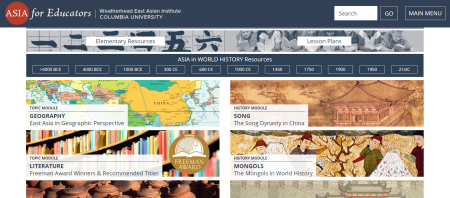ACTIONS
- Protect and safeguard cultural and natural heritage
- Learning and educational opportunities
- Cultural participation/social inclusion
- Sustainable tourism
- Support research
- Employment (recruiting, training, safety)
- Energy consumption, greenhouse gas emissions
- Waste management and reduction
- Transport (forms of, energy use)
- Commercial activities including copyright and IP
- Governance and management
- Security, disaster preparedness, risk reduction
- External partnerships and collaborations
- Toolkit/framework/roadmap
- Sign-post to other resource (database)
- Lesson plans
- Images
- Maps
Asia for Educators
- Weatherhead East Asian Institute, Columbia University
“An initiative of the Weatherhead East Asian Institute at Columbia University, Asia for Educators (AFE) is designed to serve faculty and students in world history, culture, geography, art, and literature at the undergraduate and pre-college levels.”
Avaiable in
- English
SDGs LINKAGES
The SDGs are not mentioned explicitly, but this reference and education portal can help support sustainable development in various ways and address the following SDG targets: 4.1 (quality education leading to effective outcomes), 4.4 (skill enhancement for youth, intercultural understanding, communication and cultural diplomacy in particular), 4.7 (acquisition of knowledge and skills for sustainable development), 10.2 (empowerment and inclusion for all), 10.3 (reduce inequalities of outcome), 11.4 (strengthen efforts to safeguard world’s cultural heritage), 16.7 (inclusive, participatory and representative decision-making at all levels), 16.10 (ensure public access to information).
Click on the SDG Target to discover Our Collections Matter indicators
-
Our Collections Matter indicators:
- Number of programmes drawing on collections that support children at risk of exclusion or otherwise not completing primary and secondary education.
-
Our Collections Matter indicators:
- Number of young people and adults in skills-development activities and programmes drawing on collections, for employment, decent jobs and entrepreneurship.
- Increase in number of young people and adults in such programmes.
- Number and proportion of staff who have received training in the last year, to better support their contribution to the SDGs.
- Programs and processes in place to ensure the availability of a skilled workforce.
-
Our Collections Matter indicators:
- Numbers of people in each type of programme drawing on collections from different demographic groups.
- Increases in numbers of people in each type of programme from different demographic groups.
- Proportion of people involved in such programmes in relation to overall audience size.
- Evidence that learners have acquired knowledge and skills to promote sustainable development.
-
Our Collections Matter indicators:
- Collections development to ensure that collections effectively meet the needs of all, irrespective of age, sex, disability, race, ethnicity, origin, religion or economic or other status.
- Number and proportion of educational and participatory programmes that promote participation irrespective of social or other status.
- Numbers and proportions of people making use of collections in relation to the demographic of the local population.
- Numbers and proportions of people involved in focused programmes aimed at promoting social, economic and political inclusion.
- Numbers and proportions of people from different demographic groups involved in decision-making processes relating to collections and collections-based institutions.
- Number and types of partnerships that build relationships with marginalized groups, individuals and communities.
-
Our Collections Matter indicators:
- Identification of discriminatory policies and practices, with clear plans to address these, to ensure equal opportunity for all and reduce inequalities of outcome.
- Collections development to uphold and promote legislation and anti-discriminatory perspectives, with the aim of reducing inequality within and between countries.
- Education and participatory programmes that promote anti-discriminatory legislation, policies and action, with the aim of reducing inequality within and between countries.
- Research that supports anti-discriminatory legislation, policies and action, with the aim of reducing inequality within and between countries.
- Participation in partnerships that promote anti-discriminatory legislation, policies and action, with the aim of reducing inequality within and between countries.
-
Our Collections Matter indicators:
- Total expenditure (public and private) per capita spent on the preservation, protection and conservation of all cultural and natural heritage, by type of heritage.
- Plans, policies and procedures in place for the safe use of collections for a variety of purposes, protecting and safeguarding both collections and those who use them.
- Plans, policies and procedures in place for the identification, safeguarding and protection of cultural and natural heritage at risk.
- Collecting programmes in place to protect, safeguard and make use of cultural and natural heritage, addressing the needs of communities and stakeholders, and ensuring that collections can be an effective resource for sustainable development.
- Number and diversity of educational, awareness-raising, research programmes, and partnerships that aim to strengthen protection of cultural and natural heritage.
-
Our Collections Matter indicators:
- Proportions of positions (by sex, age, persons with disabilities and population groups) in public institutions (national and local legislatures, public service, and judiciary) compared to national distributions.
- Proportion of population [audience/users/non-users] who believe decision-making is inclusive and responsive, by sex, age, disability and population group.
- Decision-making addresses societal, environmental and economic challenges related to the community, considering short-term and long-term risks and opportunities.
- Decision-making draws on diverse backgrounds, viewpoints and interests, reflecting a broad base of stakeholders, and working to promote inclusion and provide effective services for all of society.
-
Our Collections Matter indicators:
- Adopt and implement constitutional, statutory and/or policy guarantees for public access to information.
- Plans in place, and plans implemented to enhance public access to information relating to collections.
- Plans in place, and plans implemented to support fundamental freedoms, in line with human rights, national and international agreements and legislation.
- Plans and procedures in place for public access to information relating to the operation and management of collections-based institutions.
- Complaint mechanism in place for public to use where public access to information and fundamental freedoms not supported or fulfilled.

